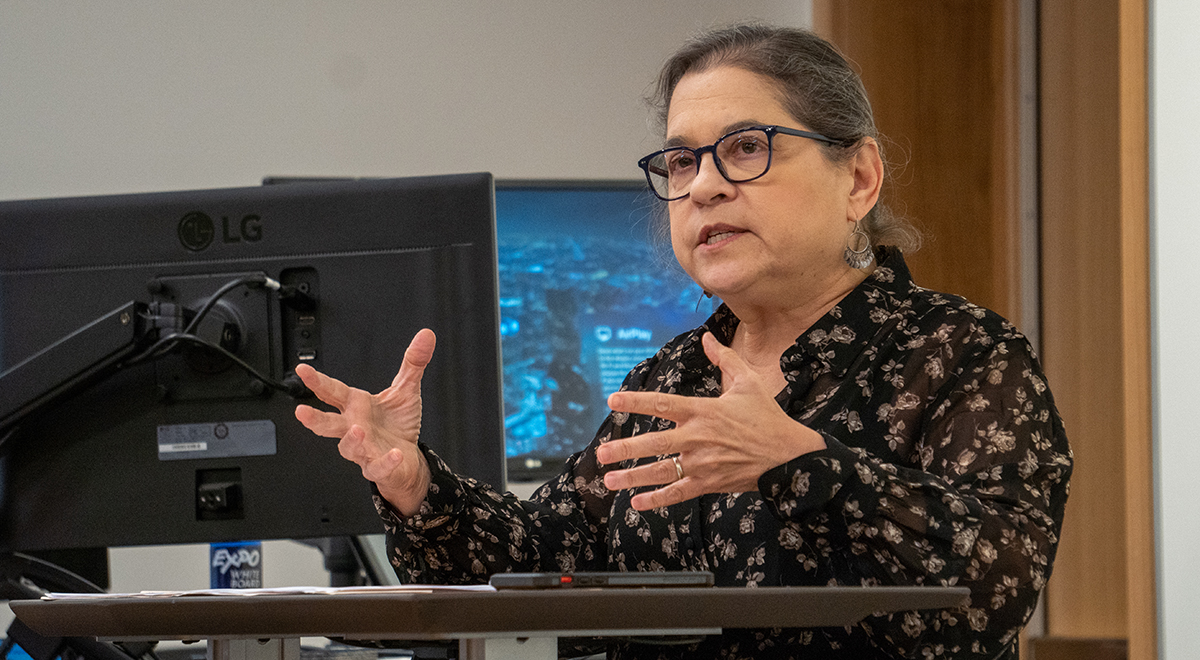Alumni Author Talk on Religion and the Presidential Race

What do Christian, Jewish, and Hindu Americans have in common? They all have someone representing their faith on the national political stage in the 2024 presidential campaign.
That intersection of religion and politics was the focus of a talk, “The Fluidity of American Faith: Real Talk about Religion and the 2024 Presidential Race,” by investigative journalist and author Sarah Posner ’86 on Oct. 17 at the Frank Center for Public Affairs.
In introducing Posner, Department of Religion Chair Andrew Quintman said, “religion informs our understanding of so many aspects of our human life and that’s especially true of our current moment in American politics.”
Reminding the audience of students, faculty, and staff that voting had already started in some parts of the country, he added, “during this current election cycle, we’ve seen that religion, religious identity, affiliation and affect have intersected with presidential politics in truly unprecedented ways.”
To the packed classroom, Posner set the stage for her talk by outlining several historic firsts in the 2024 presidential campaign: On the Democratic side, the first Black and South Asian American female candidate—who was raised with both Christian and Hindu influences, and is married to a Jewish man—is running with a vice presidential candidate who converted from Catholicism to Lutheranism. On the Republic side, there’s another Catholic convert who is married to a Hindu spouse, running with a former president who has “transformed American evangelicalism,” Posner said.
“We do not have a religious test for office in our Constitution and we have a separation of church and state,” said Posner. “But it is a reality of presidential campaigning that the candidates, even the Democrats, are going to address it.”
While Trump and Vance are presenting themselves as the “true American religion” that represents the country’s Christian heritage, Posner said, Harris and Walz represent the fluidity of religion in 21st Century America, with a focus on personal freedom and autonomy.
Both campaigns have invoked scripture on the campaign trail. Harris cited specific Bible verses during recent appearances, including at a Black church, said Posner. Trump has been selling branded Bibles.
Posner drew a sharp contrast in terms of how the campaigns have leaned into faith and spirituality. Harris and Walz, she said, “represent something more stable, especially in contrast to the tumultuous changes within Christianity that Trump and Vance represent.”
Polling shows a stark divide in terms of who religious voters support. The Pew Research Center found that 82 percent of white evangelicals, 61 percent of white Catholics, and 58 percent of non-evangelical white Protestants support Trump and Vance. By contrast, Harris and Walz are winning majorities of Black Protestants, atheists, agnostics, Hispanic Catholics, and Jewish voters.
Posner wrapped up her talk by saying, “We’re talking about what’s at stake in the election in terms of democracy. And that’s pretty evident to all of you if you’re keeping up with the news. But it also has a lot to do with, what does religious freedom mean in America now?”
After her presentation, Posner took questions from students and faculty in the audience about such issues as religion and immigration, the impact of political violence, and social media.
Posner is an MSNBC columnist and author of Unholy: How White Christian Nationalists Powered the Trump Presidency, and the Devastating Legacy They Left Behind. Her investigative reporting and analysis have been published in the New York Times, Washington Post, Politico, The New Republic, Mother Jones, and Rolling Stone.
The talk was sponsored by the Department of Religion and co-sponsored by the Center for Jewish Studies and Allbritton Center for the Study of Public Life. To learn more about the Religion Department, follow them on Instagram (@wesreligiondepartment) or subscribe to their newsletter.

